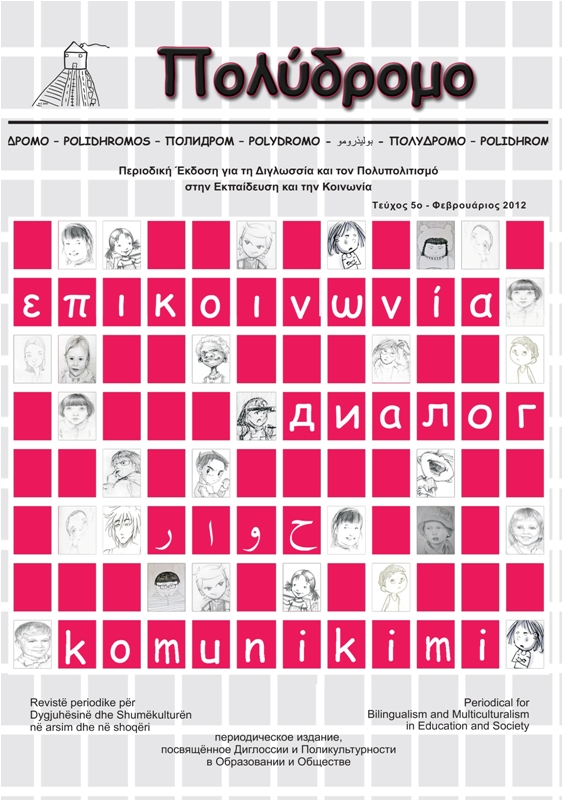The 5th issue of Polydromo is the first one after the 1st International Conference entitled 'Crossroad oflanguages and cultures: learning beyond the classroom', held in April 2011 at the Faculty of Education of the Aristotle University of Thessaloniki.
By definition, the ‘Polydromo’ group alludes to a ‘crossroad’ or, in other words, to a meeting and crossing of languages, cultures and identities.We, who support this ‘meeting’ which occurs either at a personal or communal level, often wonder about the way, the conditions and its various consequences. The organisation of the 1st ‘Crossroad’, which became feasible thanks to the material and moral support of many institutions, was an effort to trace this meeting of languages and cultures – through the meeting of the university with the society in general, as well as with immigrant organisations. The challenge was a given, but our intention to meet it and learn from it was even stronger.
The response of young researchers, educators, volunteers that teach Greek to immigrants, but also of immigrant communities, was impressive. For this, we would like to thank everybody that attended and participated in the '1st Crossroad'.
On the other hand, one of the most important aims of our conference, that is the contact between our group and the academic community with the organised groups of immigrants, though having been initialised, we consider that it requires more focus, persistence and time. Through 'Polydromo' we have been, in the last few years, making a systematic effort to approach and listen to the immigrant communities by publicizing their own experiences. However, the active involvement of immigrants in our activities is still limited. This is a reality that deserves to raise questions among us or, at least, to challenge us to discover other more substantial and more creativeways of contact with the immigrant communities.
Nevertheless, the 5th issue of Polydromo is now in circulation in a unique framework of reference, both in Greece and internationally, formed by the dire financial situation in Greece, Europe and other continents to follow suit.
Our everyday lives are changing towards unknown destinations, while the problems of the times often shake our confidence in our practices up to now, in both a personal and a professional level. Is it as important for us, as it was a year ago, to focus on issues of multiculturalism and the integration of immigrants into the Greek society, when Greece itself is becoming a country of new migration? How will the financial crisis influence the immigrants already settled in our country and the influx of potential new immigrants? Also, how much will probable changes in our political system affect government policies on the issue of the integration of immigrants?
In any case, we believe that, either as a country of immigrants or a country of new migrants, issues of multilingualism and multiculturalism are still relevant and sought for in Greece and other societies in general. Consequently, this new reality also justifies and renews our focus on the issues of the contact between languages and cultures locally, as well as internationally.
The editorial committee






